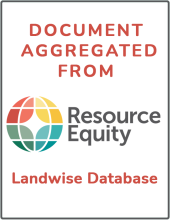/ library resources
Showing items 100 through 108 of 73379.LandLibrary Resource
31 Diciembre 2017
Paginación
Land Library Search
Through our robust search engine, you can search for any item of the over 64,800 highly curated resources in the Land Library.
If you would like to find an overview of what is possible, feel free to peruse the Search Guide.

